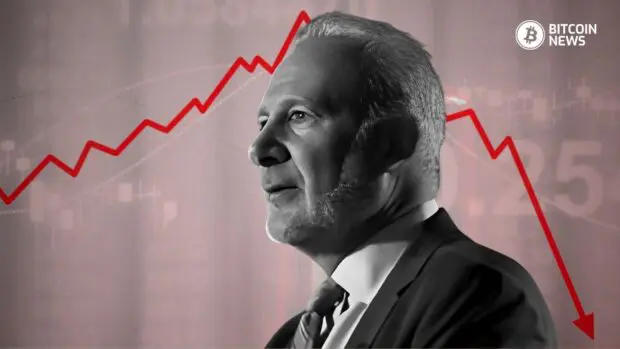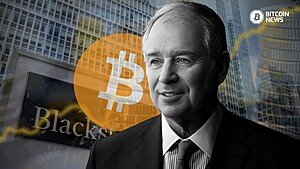Renowned economist Peter Schiff has been sounding alarm bells recently, cautioning against the current economic optimism and the surging popularity of Bitcoin. He draws parallels to past financial crises and emphasizes the importance of prudent investment choices. Peter Schiff warnings align with those of other experts who suggest that current economic conditions could lead to a crisis even more severe than the one experienced in 2008.
Related reading: Dimon Warns About Recession: “I’m Not Trying to Scare People”
Peter Schiff Warning: Economic Outlook
In a series of analyses, Schiff highlights concerns about the trajectory of the U.S. economy, echoing sentiments reminiscent of the prelude to the 2008 financial crisis. He criticizes Federal Reserve Chair Jerome Powell‘s optimism, warning that it could lead to dire consequences.
Related reading: Robert Kiyosaki: “Savers are Losers, Fed Will Destroy US Economy”
Schiff asserts:
“Powell’s current optimism on the state of the U.S. economy is even more misguided than was Bernanke’s optimism on the economy during the months leading up to the 2008 financial crisis, we are now on the verge of a far more devastating financial and economic outcome.”
His remarks underline the urgency of reassessing current economic policies and strategies.
Inflation and Monetary Policy
Schiff’s analysis delves into the complexities of inflation and monetary policy. He challenges the Fed’s inflation forecasts, arguing that the market, reflected in gold prices, provides a more reliable indicator. Schiff emphasizes the impact of inflation on everyday consumers, stating:
“Falling real wages forced consumers to borrow more and deplete savings to pay higher prices to buy less stuff.”
Additionally, he underscores the significance of money supply in understanding economic direction, cautioning against ignoring its inflationary effects. He asked: “Is an explosive more up in commodity prices in 2024 consistent with lower inflation and a falling CPI?”
He expressed skepticism towards the Federal Reserve’s actions, suggesting that its priorities lie more with supporting the government and banks than addressing potential inflation concerns. He referenced a theory proposed by Mr. Wenzel, inspired by Murray Rothbard, which suggests that significant drops in money supply could signal stock market pullbacks due to liquidity issues.
Schiff also criticized the Fed’s inflation projections, contrasting them with the rising price of gold, which he views as a more reliable indicator. He argued that if the Fed truly relied on data, the increasing gold price would prompt it to raise interest rates instead of maintaining its current stance.
Bitcoin’s Rise and Gold’s Endurance
Schiff’s warnings extend to the realm of digital assets, particularly Bitcoin. He expresses concern over the preference of young people for Bitcoin over gold, attributing it to “ignorance and lack of experience.”
Schiff predicts a shift towards gold as investors mature, emphasizing its enduring value compared to the volatility of Bitcoin. Despite Bitcoin’s popularity, Schiff remains steadfast in his advocacy for gold as a reliable store of value.
He said:
“The reason young people prefer Bitcoin to gold, other than ignorance and lack of experience, is that during their short lifetimes, Bitcoin is up much more than gold. But by the time they gain the wisdom that comes with age, Bitcoin will have collapsed and they will prefer gold.”
Persistent Criticism of Bitcoin
Schiff’s skepticism towards Bitcoin has been consistent, aligning with his advocacy for gold. Despite bitcoin’s recent bullish run, Schiff questions its long-term sustainability and intrinsic value. He highlights the dependence of Bitcoin’s success on increasing buying pressure, contrasting it with tangible assets like real estate.
He asserts:
“The truth is the real success of Bitcoin rests on more people buying it. If you own it, you need to get many of your friends or colleagues to buy it because that’s the only way its prices go up. Bitcoin is not an asset like real estate where you can collect rent, stocks where you could collect a dividend or bonds where you get paid interest,”
Conclusion
Peter Schiff’s warnings regarding the economy offer valuable insights into current economic trends. His comparisons to past financial crises and emphasis on prudent investment choices underscore the importance of vigilance in navigating today’s economic landscape.
As uncertainties persist, Schiff’s perspectives serve as a timely reminder to investors to exercise caution and consider the long-term implications of their financial decisions. While Schiff maintains his skepticism towards Bitcoin, his warnings about looming economic challenges align with the concerns shared by many in the Bitcoin community.
This seems to be the only matter than bitcoiners and Schiff agree on: We are in dire economic conditions.










